Protests have erupted in Syria in response to the burning of a Christmas tree, inciting demands for the newly established Islamist authorities to take measures to protect minority communities. A viral video showcased the burning tree in Suqaylabiyah, a town predominantly inhabited by Christians. Hayat Tahrir al-Sham (HTS), the principal Islamist faction that was instrumental in the uprising against President Bashar al-Assad, reported that foreign fighters have been detained in connection with the incident.
Further footage revealed masked individuals pouring a liquid on the Christmas tree just prior to the Christmas Eve celebrations, leaving unclear intent as to whether the action was to extinguish the flame or contribute to its spread. Subsequent videos featured an HTS religious leader reassuring local communities that the tree would be restored before Christmas Day. The leader, notably, displayed a cross, signaling an unusual act of solidarity from an Islamist faction.
As outrage grew, more demonstrators took to the streets in urban centers such as Damascus. In the Kassa neighborhood, protesters vocally opposed the presence of foreign fighters in Syria, chanting "Syria is free, non-Syrians should leave." Demonstrators in the Bab Touma district marched holding crosses and Syrian flags, declaring, "we will sacrifice our souls for our cross." One protestor expressed deep concerns about the future of Christians in Syria, stating, “If we're not allowed to live our Christian faith in our country, as we used to, then we don't belong here anymore.”
Syria's diverse ethnic and religious landscape includes various groups, such as Kurds, Armenians, Assyrians, Christians, Druze, Alawite Shia, and the Arab Sunni majority. Following the recent fall of Bashar al-Assad's regime to rebel forces, many displaced individuals are starting to return to Syria, with Turkey reporting over 25,000 returns recently. However, the future governance style of HTS, which originated as a jihadist group advocating for a state governed by Sharia law, remains to be seen, particularly as they profess a more accommodating approach in recent years.
HTS leaders have made formidable promises to construct a Syria that respects and accommodates all its citizens. Recently, an announcement indicated plans to consolidate various factions under a new Ministry of Defence, though details regarding which groups will be absorbed remain vague. Despite facing significant challenges, including the existence of numerous armed factions and the designations against HTS as a terrorist organization by multiple governing bodies, indications point towards potential shifts in international diplomacy and perceptions regarding the group.
The complexities presented by foreign fighters, Islamist radicals, and regional instability present significant hurdles for the new Islamic leadership in healing divides and ensuring security for all minorities within Syria.

















